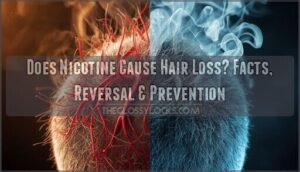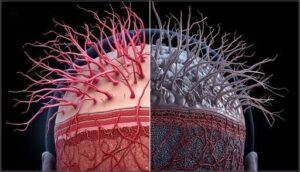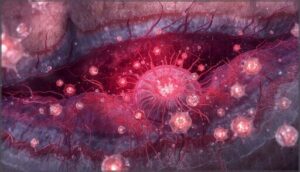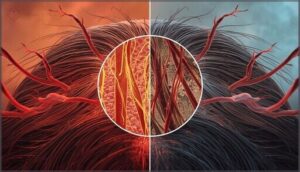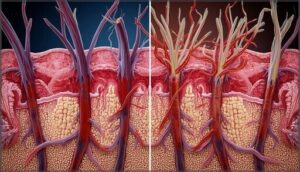This site is supported by our readers. We may earn a commission, at no cost to you, if you purchase through links.
Your hair follicles depend on a steady supply of oxygen and nutrients delivered through your scalp’s blood vessels, and nicotine constricts those vessels within seconds of entering your bloodstream. This vasoconstriction effect persists throughout nicotine exposure, whether from cigarettes, vaping devices, or other sources, potentially starving follicles of what they need to maintain healthy growth cycles.
The concern extends beyond active smokers—secondhand exposure and alternative nicotine products create similar vascular effects, though concentrations and delivery methods influence severity. Understanding how nicotine disrupts hair follicle function helps explain why users often notice changes in hair density and texture, and more importantly, what reversing those effects requires.
Table Of Contents
- Key Takeaways
- How Nicotine Enters The Body
- Nicotine’s Impact on Hair Follicles
- Does Nicotine Directly Cause Hair Loss?
- Mechanisms Linking Nicotine to Hair Thinning
- Differences Among Nicotine Products
- Is Nicotine Hair Loss Reversible?
- Preventing Hair Loss From Nicotine
- Treatment Options for Nicotine-Induced Hair Loss
- Frequently Asked Questions (FAQs)
- Can nicotine cause hair loss?
- Does lack of sleep cause hair loss?
- What causes hair to fall out if you eat nicotine?
- Does nicotine affect hair growth?
- Can smoking cause hair loss?
- Does nicotine help thinning hair & balding?
- Does nicotine cause thinning hair?
- Will hair grow back after quitting nicotine?
- Is vaping hair loss reversible?
- Can Nicorette cause hair loss?
- Conclusion
Key Takeaways
- Nicotine constricts blood vessels within seconds of entering your bloodstream, reducing oxygen and nutrient delivery to hair follicles through sustained vasoconstriction that persists across all nicotine sources, including cigarettes, vaping devices, and replacement therapies.
- Hair loss from nicotine occurs through multiple mechanisms, including disrupted growth cycles that force follicles into premature resting phases, systemic inflammation that damages follicular cells, and oxidative stress that causes DNA mutations in keratinocytes.
- Nicotine-induced hair loss can reverse within three to twelve months after quitting, with recovery speed depending on exposure duration, overall scalp health, and whether you combine cessation with targeted therapies like minoxidil or scalp massage to restore blood flow.
- Cigarettes cause more severe hair damage than isolated nicotine products because combustion introduces thousands of toxic chemicals, including tar and carbon monoxide, that accumulate in scalp tissue, though all nicotine sources trigger harmful vascular constriction that compromises follicle function.
How Nicotine Enters The Body
Nicotine enters your body through several routes, and understanding these delivery pathways helps explain how it reaches your hair follicles. The method of delivery affects absorption speed, blood concentration levels, and systemic distribution.
When nicotine constricts blood vessels, it can worsen hair loss causes like receding hairlines by starving follicles of oxygen and nutrients.
Each source exposes you to nicotine differently, which influences the extent of its impact on your scalp and hair health.
Sources of Nicotine Exposure
You’re exposed to nicotine through multiple channels, each carrying unique risks.
Tobacco products like cigarettes, cigars, and chewing tobacco deliver the highest concentrations, while e-cigarette risks stem from aerosolized nicotine salts that allow deeper absorption.
Secondhand smoke introduces nicotine to nearby non-users, and environmental exposure occurs through contaminated surfaces. Even nicotine foods like certain nightshade vegetables contain trace amounts, though dietary sources contribute minimally compared to smoking and nicotine addiction pathways.
To understand these risks more fully, it’s important to be aware of potential nicotine poisoning symptoms.
Nicotine Absorption and Distribution
Once nicotine enters your body, its journey determines how severely it affects your hair health. Nicotine uptake varies dramatically by route, with smoking delivering rapid systemic exposure that peaks within seconds as blood flow carries it to every organ, including your scalp. In contrast, nicotine replacement therapy products like patches provide slower transdermal delivery, reducing the intense spikes that drive nicotine addiction.
- Inhalation achieves peak arterial nicotine levels within 10-20 seconds, far faster than oral or transdermal routes
- Liver metabolism converts nicotine to cotinine, which sustains nicotine effects on hair for hours beyond the initial exposure
- Blood distribution to highly perfused organs, including your scalp, determines how quickly follicles experience vasoconstriction
- Nicotine metabolism speed varies by genetics, influencing both addiction risk and the severity of nicotine effects on hair and overall nicotine and hair health outcomes
The way nicotine is absorbed and processed in the body is a key aspect of nicotine pharmacokinetics research.
Nicotine’s Impact on Hair Follicles
Nicotine doesn’t just stay in your bloodstream—it reaches your scalp and affects the very foundation of hair growth.
Your hair follicles need consistent blood flow, oxygen, and nutrients to function properly, and nicotine disrupts all three. Here’s how nicotine damages the follicles that produce your hair.
Blood Vessel Constriction
When you inhale smoke or use a pouch, nicotine triggers vasoconstriction effects that tighten smooth muscle in vessel walls. This vascular narrowing reduces circulation throughout your scalp, and nicotine-induced constriction limits the blood flow reduction your hair follicles can withstand. Smoking and health studies confirm that chronic scalp ischemia from these changes directly undermines hair health.
| Mechanism | Immediate Effect | Long-Term Impact |
|---|---|---|
| Sympathetic nerve activation | Rapid vessel tightening | Sustained reduction in scalp perfusion |
| Endothelin release | Enhanced smooth muscle contraction | Chronic tissue oxygen deprivation |
| Increased vascular resistance | Elevated local blood pressure upstream | Follicle weakening and premature resting phase |
| Reduced nitric oxide | Imbalance favoring constriction | Progressive capillary density loss |
Reduced Nutrient and Oxygen Supply
As blood vessel tightening limits circulation, your hair follicles face nutrient deficiency and plummeting oxygen levels critical for growth.
Many wonder if stimulating the follicles through shaving could reverse this damage, but without restored blood flow, even mechanical stimulation falls short.
Reduced blood flow regulation starves each hair follicle of glucose, amino acids, and iron, while low oxygen impairs ATP production and triggers oxidative stress.
This scalp health breakdown weakens hair health, linking smoking and hair loss through sustained metabolic strain that forces follicles into premature rest.
Follicle Inflammation and Damage
Inflammation arises when nicotine triggers your immune system to flood hair follicles with white blood cells and inflammatory cytokines, causing red bumps, pustules, and tissue swelling that damage the hair shaft and bulge stem cells.
Persistent follicle damage leads to fibrosis and scarring that impair follicle repair, worsen scalp conditions, and accelerate hair loss through miniaturization and shortened growth phases.
Does Nicotine Directly Cause Hair Loss?
The relationship between nicotine and hair loss is supported by scientific research, though the strength of evidence varies depending on the source of nicotine exposure.
Studies examining smoking and hair health provide the most compelling data, while research on newer nicotine products remains limited.
Understanding what the evidence shows can help you make informed decisions about nicotine use and your hair.
Scientific Studies and Evidence
Research findings on nicotine and hair loss come from multiple study designs, ranging from large population surveys to controlled clinical trials. Evidence review shows that smoking is associated with increased risk of hair loss, though data analysis often focuses on combustible tobacco rather than nicotine alone.
Hair follicles exposed to toxins from smoking show measurable changes in blood flow and inflammation, which confirms the connection between smoking and hair loss prevention challenges.
Smoking Versus Other Nicotine Products
Cigarettes combine nicotine addiction with thousands of combustion chemicals that damage hair follicles, while smokeless alternatives such as patches, gum, or pouches deliver nicotine without tar or carbon monoxide.
Vaping risks remain under investigation, though aerosols contain fewer toxicants than tobacco smoke. For hair loss prevention, quitting strategies should address both nicotine dependence and exposure to combustion byproducts, since smoking poses greater harm than isolated nicotine use.
Mechanisms Linking Nicotine to Hair Thinning
Nicotine doesn’t just reduce blood flow to your scalp—it triggers a cascade of biological disruptions that interfere with normal hair growth at multiple levels.
These effects extend beyond simple nutrient deprivation and involve complex changes to your hair follicles‘ natural rhythm, your body’s inflammatory response, and even the genetic material inside your cells. Understanding these three key mechanisms helps explain why nicotine can have such a pronounced impact on hair health.
Disrupted Hair Growth Cycle
When nicotine restricts scalp circulation, your hair growth cycle shifts dramatically, which leads to premature shedding and thinning. Here’s how nicotine disrupts normal hair follicle activity:
- Telogen effluvium triggers sudden shedding within 12 weeks after nicotine exposure acts as a stressor.
- Anagen phase shortening limits active growth duration, reducing maximum hair length.
- Follicular miniaturization produces finer, weaker hair shafts over repeated cycles.
These mechanisms contribute to progressive hair thinning and noticeable hair loss.
Systemic Inflammation Effects
When you smoke or use nicotine products, your immune system releases inflammatory cytokines like IL-6 and CRP, which trigger widespread tissue inflammation. This inflammation response creates oxidative stress throughout your body, including your scalp, which restricts blood flow to hair follicles and amplifies cellular damage beyond local vasoconstriction alone.
| Inflammatory Effect | Impact on Hair Health |
|---|---|
| Elevated cytokine levels | Follicle dysfunction and premature shedding |
| Reduced microvascular flow | Impaired nutrient delivery to scalp |
| Increased oxidative stress | DNA damage in follicular cells |
| Chronic immune activation | Progressive hair thinning over time |
DNA and Cellular Damage
Beyond inflammation, your hair follicles face a cellular crisis when nicotine floods your system. Oxidative stress generates reactive oxygen species that attack DNA in follicular keratinocytes, creating mutations and impairing repair mechanisms.
Nicotine triggers oxidative stress that damages DNA in hair follicle cells, causing mutations and weakening natural repair
This genetic impact manifests through:
- Permanent guanine modifications that disrupt base pairing and slow cell division
- Accumulated DNA damage that triggers premature follicle miniaturization
- Overwhelmed cellular stress responses that accelerate hair thinning over time
Differences Among Nicotine Products
Not all nicotine products affect your hair in exactly the same way. Cigarettes, vaping devices, and nicotine replacement therapies each deliver nicotine through different mechanisms, which can influence the severity of hair-related effects.
Understanding these differences helps you make informed choices about your nicotine use and its potential impact on your scalp health.
Cigarettes and Hair Loss
The combustion process in tobacco products creates a dangerous mixture that goes far beyond nicotine alone. Cigarettes deliver thousands of toxic chemicals—including tar, carbon monoxide, and formaldehyde—that accumulate in your scalp tissue and directly damage the hair follicle microenvironment, while vasoconstriction from smoking chronically restricts blood flow that your follicles need for regrowth.
| Smoking Effects | Impact on Scalp Health |
|---|---|
| Tar and toxin buildup | Blocks pores, inflames follicles |
| Chronic vasoconstriction | Reduces nutrient delivery |
| Oxidative stress | Accelerates hair loss progression |
Vaping and Hair Health
Vaping delivers nicotine salts at high concentrations, which trigger vasoconstriction and inflammatory responses that restrict oxygen flow to your hair follicles.
While vaping skips the tar found in cigarettes, the aerosol introduces oxidative stress that can disrupt follicle repair and slow hair regrowth.
A nicotine detox paired with targeted scalp treatment aids follicle recovery, though individual timelines vary.
Nicotine Gum and Alternatives
Nicotine gum and oral alternatives like Nicorette deliver nicotine without combustion, which means you avoid tar and toxic particulates that accelerate follicle damage.
Pouches, lozenge therapy, and inhaler devices still constrict blood vessels and reduce scalp oxygen, though the impact may be less severe than smoking. If you’re pursuing smoking cessation or trying to quit smoking, these options support your goals while potentially limiting additional hair loss triggers.
Is Nicotine Hair Loss Reversible?
If you’ve noticed hair thinning from nicotine use, you’re probably wondering whether the damage is permanent or if your hair can bounce back.
The good news is that nicotine-related hair loss can often be reversed, though the outcome depends on several key factors. Understanding your potential for regrowth and what influences your recovery timeline will help you set realistic expectations and take the right steps forward.
Potential for Hair Regrowth
When you stop nicotine use, your hair follicles can often wake up and start growing again, especially if you catch the damage early.
Follicle stimulation through scalp massage improves nutrient delivery to dormant roots, and regrowth therapies like minoxidil can extend the growth phase.
Hair regrowth and recovery depend on how long you’ve been smoking, but many people see real improvements within months of quitting.
Factors Influencing Recovery Timeline
Your recovery speed depends on how long you’ve smoked, your overall scalp health, and how quickly you commit to nicotine detox and smoking cessation.
Follicle repair accelerates within weeks after quitting, and hair regrowth timelines vary from three to twelve months depending on the severity of hair loss.
Hair restoration improves faster when you combine nicotine elimination with targeted therapies, and hair regrowth and recovery remain most promising in early-stage thinning.
Preventing Hair Loss From Nicotine
You don’t need to accept permanent hair damage as an unavoidable consequence of nicotine use. Taking action to protect your hair involves addressing nicotine consumption directly, supporting your scalp’s health, and making strategic lifestyle adjustments.
The following strategies can help you minimize further damage and create conditions that favor healthy hair growth.
Reducing or Quitting Nicotine Use
The most effective approach to prevent nicotine-induced hair loss is complete cessation, which restores blood flow to your scalp and allows follicles to recover.
Smoking cessation methods include gradual reduction plans, nicotine replacement therapies such as patches or gum, and behavioral support programs. Quit strategies that combine medications with counseling improve success rates, and recovery plans customized to your triggers help maintain long-term nicotine detox.
Supporting Scalp and Hair Health
A consistent hair care routine promotes recovery by creating conditions that favor regrowth. Scalp massage for 2 to 5 minutes daily boosts circulation, gentle shampooing with sulfate-free formulas removes buildup without stripping oils, and weekly scalp exfoliation clears follicle-clogging debris.
These healthy habits improve hair health, reinforce hair loss prevention, and complement broader hair restoration efforts when combined with smoking cessation.
Nutritional and Lifestyle Strategies
Balanced diets rich in protein, biotin, zinc, and iron create the foundation your follicles need to rebuild after nicotine damage. Nutrient support combined with stress management techniques—meditation, regular exercise, and 7 to 9 hours of sleep—lowers cortisol and restores blood flow to your scalp.
Healthy habits that support hair loss prevention include:
- Eating fatty fish twice weekly for omega-3 fatty acids
- Consuming five servings of fruits and vegetables daily
- Drinking 2.7 to 3.7 liters of water to hydrate your scalp
- Supplementing biotin or iron only after testing confirms deficiency
- Practicing 10 minutes of daily mindfulness to reduce stress hormones
Hair supplements may help if testing reveals deficiencies, but whole-food nutrition remains the most effective strategy for smoking and hair loss recovery.
Treatment Options for Nicotine-Induced Hair Loss
If you’ve noticed thinning hair from nicotine use, several evidence-based treatments can help restore growth and improve scalp health.
Your options range from FDA-approved topical medications to sophisticated restoration procedures, and many people benefit from combining treatments with smoking cessation support.
The approach you choose depends on the severity of your hair loss, your nicotine use patterns, and whether you’re ready to quit or reduce your intake.
Medical Therapies and Topicals
If you’re dealing with nicotine-related hair loss, medical therapies and topical formulations can help.
Minoxidil treatment, applied as a 2 percent or 5 percent solution, extends the growth phase and promotes hair regrowth over several months.
Anti-inflammatory scalp therapy with topical corticosteroids reduces follicle inflammation, which aids retention and restoration when nicotine has disrupted your hair’s normal cycle.
Hair Restoration Procedures
Hair restoration techniques offer sophisticated solutions when topical therapies fall short. Hair transplantation moves follicles from resistant donor zones to thinning areas using methods that preserve natural growth patterns and density.
Key restoration surgery options include:
- Follicular unit extraction which harvests individual grafts with minimal scarring
- Strip harvesting for maximum graft yield in one session
- Scalp therapy combining microneedling with platelet-rich plasma to stimulate follicle repair and hair regrowth
Support for Smoking Cessation
Stopping nicotine use reverses much of the harm to your scalp, and smoking cessation programs give you the structure to succeed.
Counseling services help you build quit plans that address tobacco addiction through nicotine replacement therapy, prescription medications like varenicline, and support groups that reinforce relapse prevention. Follow-up appointments track your progress and adjust strategies, linking smoking cessation and hair health improvements over time.
Frequently Asked Questions (FAQs)
Can nicotine cause hair loss?
Yes, nicotine can contribute to hair loss by constricting scalp blood vessels, reducing oxygen and nutrient delivery to follicles, triggering inflammation, and disrupting the normal hair growth cycle through repeated exposure.
Does lack of sleep cause hair loss?
Burning the midnight oil catches up with your scalp.
Sleep deprivation raises stress hormones that push hairs into the resting phase, triggering hair shedding and hair thinning over weeks to months.
What causes hair to fall out if you eat nicotine?
When you ingest nicotine, your body absorbs it through the gut into the bloodstream, where nicotine metabolism produces compounds that constrict scalp blood vessels, limiting oxygen and nutrients to hair follicles and triggering hair follicle damage.
Does nicotine affect hair growth?
Nicotine disrupts the hair growth cycle by shortening the anagen phase, which limits how long your follicles produce new strands, and triggers systemic inflammation that impairs scalp health and hair regeneration.
Can smoking cause hair loss?
Where there’s smoke, there’s often hair loss. Smoking damages your scalp health through vasoconstriction and inflammation, weakening hair follicles and disrupting growth cycles, which frequently leads to noticeable tobacco-related thinning and shedding.
Does nicotine help thinning hair & balding?
No, nicotine doesn’t help thinning hair or balding prevention. It worsens hair loss by constricting scalp blood vessels, which reduces nutrient delivery to follicles and accelerates hair thinning and baldness progression.
Does nicotine cause thinning hair?
Research shows smokers face 2-4 times higher risk of hair thinning than nonsmokers.
Nicotine constricts scalp blood vessels, limiting oxygen and nutrient delivery to follicles, which disrupts the growth cycle and accelerates shedding.
Will hair grow back after quitting nicotine?
Yes, your hair can grow back after quitting nicotine. Improved scalp blood flow, reduced inflammation, and restored follicle function often lead to visible hair regrowth within three to six months of cessation.
Is vaping hair loss reversible?
If you stop vaping early, hair regrowth is possible through improved scalp health and circulation.
Recovery tips include nicotine detox, hair restoration support, and managing vape addiction to reverse smoking-related hair loss.
Can Nicorette cause hair loss?
Anecdotal reports link hair thinning with long-term Nicorette gum use, though direct causality isn’t established in medical guidelines.
Like other nicotine sources, gum can constrict scalp blood vessels, potentially affecting follicle health over time.
Conclusion
The bottom line is that nicotine causes hair loss through vascular constriction, nutrient deprivation, and cellular damage to follicles, but cessation can reverse these effects within months for many users.
Your hair’s recovery depends on how quickly you stop nicotine exposure, support scalp circulation, and maintain adequate nutrition. The evidence strongly favors quitting entirely over switching products, as all nicotine sources trigger similar vascular responses that compromise follicle health and disrupt normal growth cycles.
- https://www.ncbi.nlm.nih.gov/pmc/articles/PMC8280411/
- https://www.cancer.org/cancer/risk-prevention/tobacco/benefits-of-quitting-smoking-over-time.html
- https://us.zyn.com/questions/
- https://pubmed.ncbi.nlm.nih.gov/28925637/
- https://scholar.google.com/scholar_lookup?journal=Am%20Fam%20Physician&title=Hair%20loss:%20common%20causes%20and%20treatment&author=TG%20Phillips&author=WP%20Slomiany&author=R%20Allison&volume=96&issue=(6)&publication_year=2017%20Sep%2015&pages=371-8&pmid=28925637&

